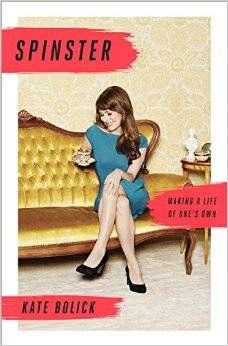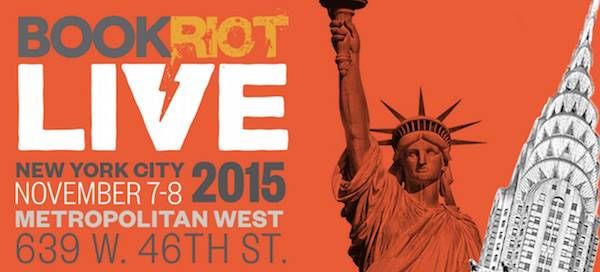
Every Reader Needs a Secret Coven
This is a guest post from Valerie Michael. Valerie is a book-ish, outdoors-y, burger-eating, beer-drinking scientist from Pittsburgh, PA. She is obsessed with books and hiking in equal measure and she’d be happy to show you pictures on her iPhone of her two dogs. Follow her on Twitter @valeriexcm.
____________________

Part of this book is the story of her navigating the challenges of a life of personal and financial uncertainty and of choosing to remain unmarried in a world that doesn’t condone this choice. The other part is an examination of five incredible women whose lives and work have special significance to Bolick – Neith Boyce, Maeve Brennan, Charlotte Perkins Gilman, Edna St. Vincent Millay, and Edith Wharton.
Bolick describes these women as her “awakeners,” a term that she borrows from Edith Wharton, a “secret coven” of women writers to whom she feels a strong sense of connection. At one point she describes herself imagining them all gathered in her apartment, “my secret coven leaned over a card table spiking the teacups with whiskey and carrying on lively debates.”
I was struck by reading this because it felt intensely familiar. These are not just women whom she admires and enjoys reading- the relationship goes much deeper. These women are friends and confidants, they live and breath and speak in Bolick’s everyday life. She doesn’t even need to open a book to access them, they are in her very home, talking gossiping and chatting over “whiskey-spiked tea.”
Reading this was a light-bulb moment for me, both a realization and a validation. By defining the relationship she has with these five women, Bolick gave focus to a key, previously peripheral aspect of my reading life. She had given name, given substance to the experience of kinship with literary figures that I have felt strongly.
I have favorite authors that I love and revere – Margaret Atwood, Toni Morrison, Marilynne Robinson, Chimamanda Ngozi Adichie, Jhumpa Lahiri, Zadie Smith. And then I have authors that I love in the specific, personal way that Bolick describes: women that I claim as my own, women that are members of my secret coven, women that awaken and connect me to the life I want to create.
Kate Bolick’s secret coven represents the independence to write and thrive alone in New York City, an intellectual platform from which to stand up against a society that considers marriage to be the apex of a woman’s life. My counterpart is a group of women who write with passion and beauty about nature and our position as humans relative to the natural world: Barbara Kingsolver, Terry Tempest Williams, Rebecca Solnit, and Mary Oliver.
When I imagine my gatherings with these women, we are sitting around a campfire in the desert or by a mountain lake. We are tired from a strenuous day of hiking but calm and happy. We smell of dirt and sweat and fresh air. We wrap our arms around our legs as the air grows cooler and we talk about conservation, about birds and flowers, about the defining features of the landscape, about freedom and wildness. The hypothetical conversations draw from some of my favorite lines of their works:
“What we lose in our great human exodus from the land is a rooted sense, as deep and intangible as religious faith, of why we need to hold on to the wild and beautiful places that once surrounded us.”
-Barbara Kingsolver, Small Wonder
“I pray to the birds because they remind me of what I love rather than what I fear. And at the end of my prayers, they teach me how to listen.”
-Terry Tempest Williams, Refuge: An Unnatural History of Family and Place
“I grew up with landscape as a recourse, with the possibility of exiting the horizontal realm of social relations for a vertical alignment with earth and sky, matter and spirit. Vast open spaces speak best to this craving, the spaces I myself first found in the desert and then in the western grasslands.”
–A Field Guide to Getting Lost, A Field Guide to Getting Lost
“Meanwhile the wild geese, high in the clean blue air,
are heading home again.
Whoever you are, no matter how lonely,
the world offers itself to your imagination,
calls to you like the wild geese, harsh and exciting,
over and over announcing your place in the family of things.”
-Mary Oliver, Wild Geese
There are myriad potential lessons to take from Kate Bolick’s story. To me, the takeaway of Spinster was that every reader needs their own secret coven. Every reader has permission to get personal with the writers that spark and awaken them.
____________________
Book Riot Live is coming! Join us for a two-day event full of books, authors, and an all around good time. It’s the convention for book lovers that we’ve always wanted to attend. So we are doing it ourselves.












